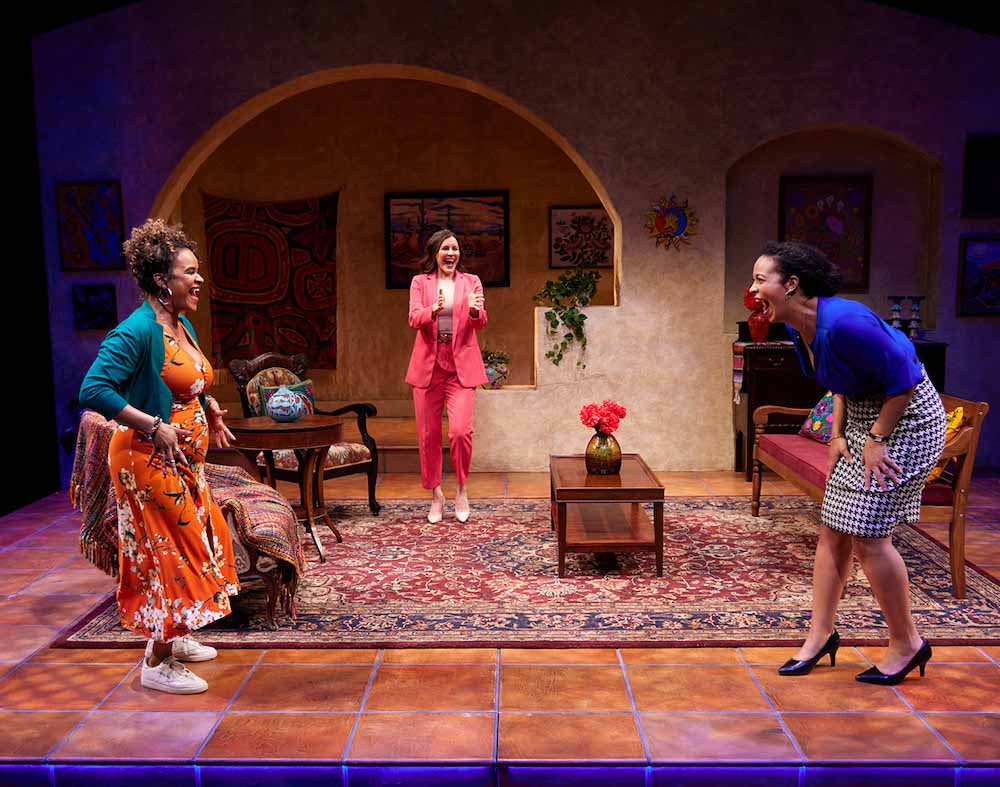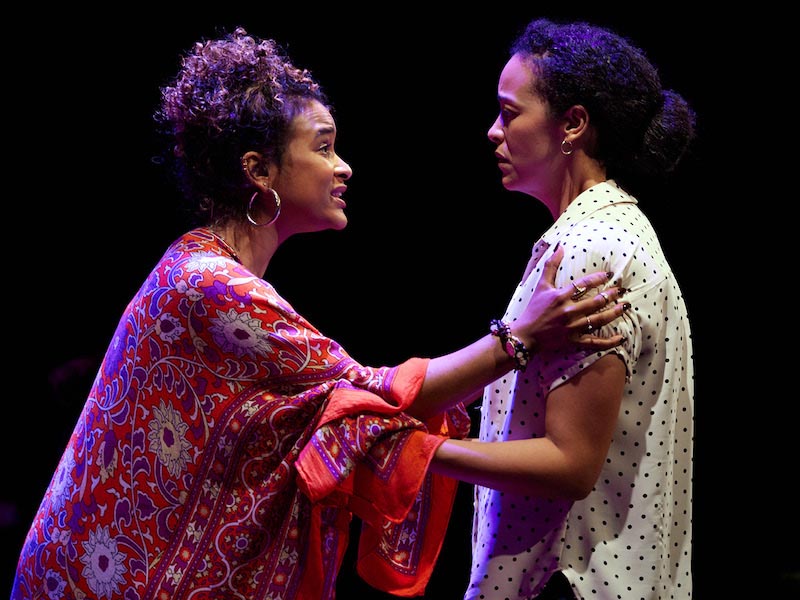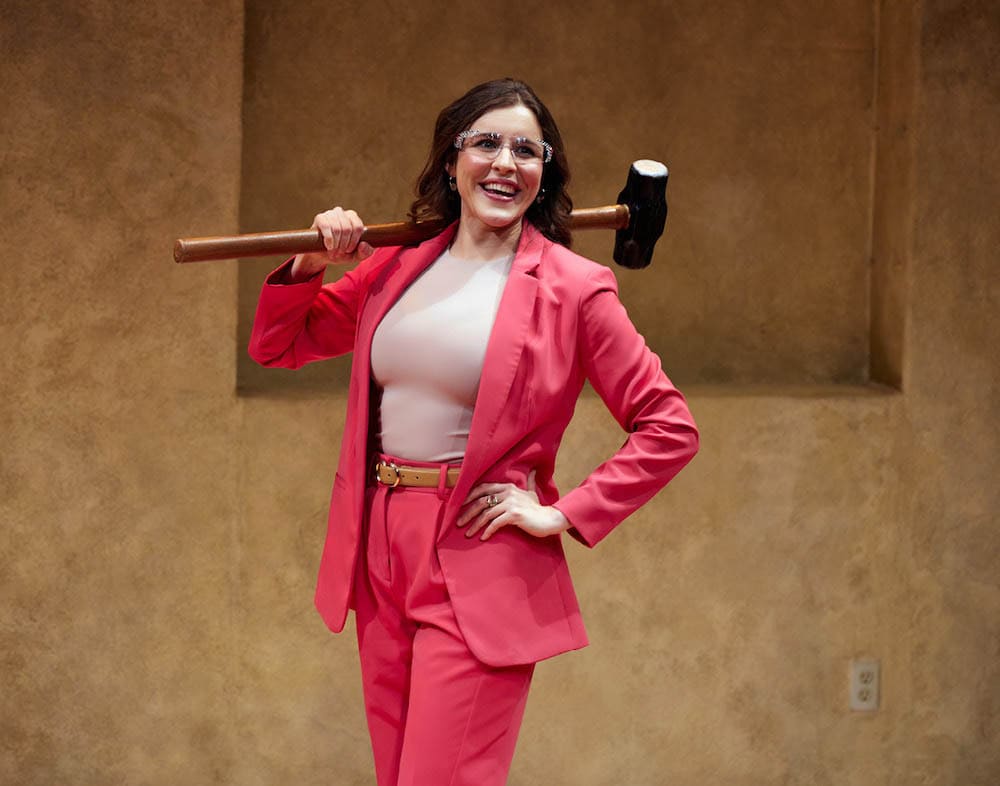The world premiere of Eliana Pipes’s Dream Hou$e at Baltimore Center Stage begins as a traditional family melodrama and spirals into the surreal. Covering everything from gentrification, cultural assimilation, family history, and colonization, it’s also a play that will haunt you for a long time.
The premise starts on a familiar note: Two very different sisters disagree about whether to sell their childhood home after the death of their mother. Their Latinx neighborhood has rapidly gentrified and the expected offer on their home could set both sisters up for life. Playwright Eliana Pipes’s deft satire asks tough questions: What’s your price? What are you willing to sell for the American dream? How valuable are heritage and memories? When have you sold out?

Patricia (Renata Eastlick) is the older sister, a sensible accountant and a bit of a stick-in-the-mud, who paused her career to move back home and act as a caretaker. Now, she only associates the house with death and grief. Julia (Darilyn Castillo) is the younger sister who always wanted to move away. Now that she is pregnant, Julia returns to her childhood and is reluctant to sell it.
Castillo plays the younger sister as an earth-mother figure, who burns sage, makes her own herbal remedies, and enjoys the bougie chain cafe tea that competes with the local coffee vendor. Full of nostalgic wonderment and invested in the romanticized history of the great-grandfather who built the home, Castillo can be wide-eyed and sentimental. But she also quietly plays up Julia’s insecurities as a soon-to-be single mother and her guilt for neglecting her family when they needed her most.
But it is Eastlick’s character who slowly devolves as we learn more about her darker desires to sell the family home. Patricia is a traditional first child, ambitious and bossy, but it’s not just the trauma of her mother’s death that is her motivation to sell. She wants money and social prestige; she dreams of country clubs and sending back steaks. An avid watcher of home makeover shows, she contacts her favorite host to help sell her childhood home for a hefty paycheck.
And that is where Dream Hou$e morphs into a nightmarish vision and biting satire.

The play is not just another American dream story hinging on homeownership à la A Raisin in the Sun but staged as a reality show. The ensemble cast — Ricardo Blagrove, Zipporah Brown, Alix Fenhagen, and Zak Rosen — bustle around on- and offstage as camera operators, contractors, and interior designers, physically manipulating the set. They empty the stage of old furniture and unfurl new rugs; they dismantle walls and tack up plastic sheeting; they transform the familiar domicile into a place uncanny and hostile.
As reality shows bring out the worst in people, the sisters turn into bitter rivals, deriding one another for playing down (Patricia) or playing up (Julia) their ethnicity for the cameras.
Marianna McClellan plays “Flip and List It” host Tessa in a hot pink suit and high heels. With her manic energy and smile that can extend to a Joker grimace, McClellan’s performance of Tessa becomes more sinister as she pits the sisters against each other and asks probing questions in a cruel bonus round game. In the play’s grimmest moment, Tessa — who knows everything has a price — buys and demands from a besotted Patricia her jewelry, her clothes, and something much more precious and irreplaceable. It is in this scene as Patricia sells out that Eastlick gives her most naked, vulnerable performance.
Stephanie Osin Cohen’s set design and Mark Holthusen’s projection designs morph the adobe walls of the family home into a dreamy night sky when the sisters pause time to discuss their reservations or into a sleek interior design vision during “Flip It and List It” scenes. But as the renovation progresses, the house becomes its own vengeful character, a haunted house, full of secrets and dangers within its walls. (I can’t say more about the home transformations other than it’s surprising and horrific.)
It’s a powerful play, and director Laurie Woolery beautifully plays up the satirical and sentimental elements in equal measure, masterfully moving between realistic and surrealistic registers.

Yet, there are a few moments that don’t sit right. Julia, an elementary social studies teacher, can become preachy when sharing her family’s history and the larger histories of American colonization and racism. (The play more than adequately shows this as the white television host takes over and remakes the Latinx family home in her own image, first adding store-bought Latinx decor and then stripping away all semblance of the previous owners.)
Besides the competing local and trendy chain cafes, we also don’t get a sense of the rest of the neighbors. We know that it was a Latinx working-class neighborhood, but where are the family friends now? Are all of the neighbors flipping and selling? Are there any acts of resistance, homeowners who will stay? Having a sense of what is happening to the neighbors on their block could underscore this family’s disagreement in even more powerful ways. Without other models of resistance, the play offers a one-sided approach to how gentrification plays out. The sisters’ decision to renovate and sell (even in the outlandish and fabricated landscape of HGTV) deconstructs their agency.
On opening night, Baltimore Center Stage’s Artistic Director Stephanie Ybarra thanked Eliana Pipes for composing a work that represents Latinx women and families, for giving voice to this story and these issues. The bilingual dramaturgical essay by Dr. Felipe A. Filomeno (available in the Dream Hou$e program) offers a short history of Baltimore’s Latinx communities and the negative effects of gentrification. Co-produced with Alliance Theatre (Atlanta, GA) and Long Wharf Theatre (New Haven, CT), Dream Hou$e is an exciting, visceral work that speaks to timely issues in novel ways.
Running Time: 90 minutes with no intermission.
Dream Hou$e plays through May 15, 2022, at Baltimore Center Stage – 700 North Calvert Street, Baltimore, MD. For tickets, at Baltimore Center Stage, 700 North Calvert Street, Baltimore, MD. For tickets (starting at $49 with discounts available for seniors and students), call the box office at (410) 332-0033 or purchase online, where live-streaming tickets ($20) for selected performances are also available.
The Dream Hou$e program is online here.
COVID Safety: Baltimore Center Stage’s first priority is the health, safety, and well-being of our audiences, staff, artists, and guests. Our current policy is that masks must be worn at Baltimore Center Stage and may only be removed in designated eating and drinking areas. Proof of vaccination — or a negative COVID PCR test within 72 hours of showtime — is required. BSC’s COVID-19 Information and Resource Page is here.




